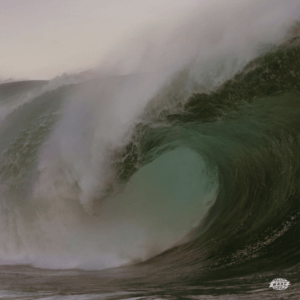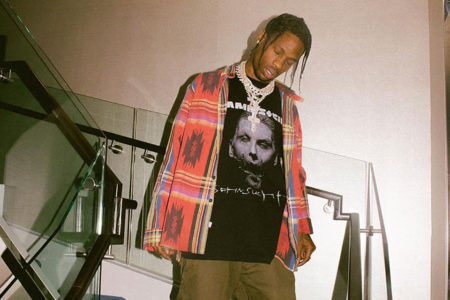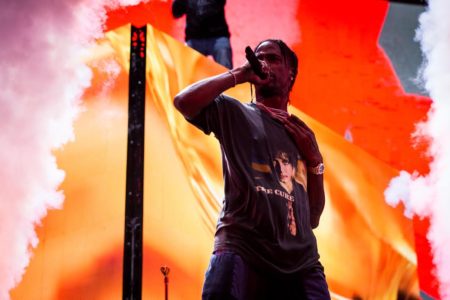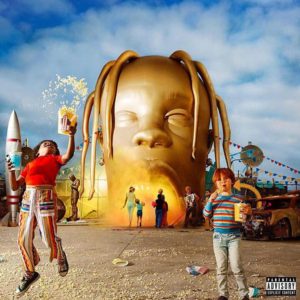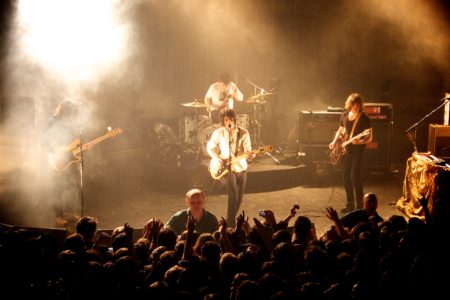Is Travis Scott’s “Astroworld” the Birth of an Icon?
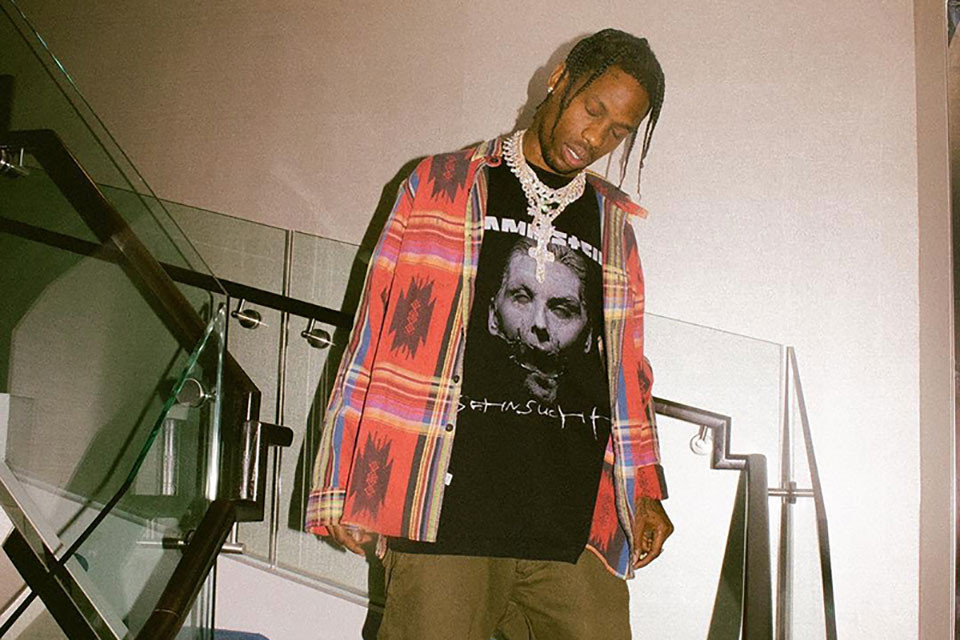
Among today’s biggest rap stars, few are as enigmatic as Travis Scott. Following two much-buzzed about mixtapes, 2013’s Owl Pharaoah and Days Before Rodeo the following year, the 26-year-old Houston rapper has experienced a career paved with peaks and valleys, as he’s garnered high sales figures and a massive following while being criticized just as much for his sound, supposed lack of originality or musical evolution, and for being well-connected relative to his talent. Now riding a tsunami of success off his recently released third album Astroworld, it leaves one to wonder if the artist born Jacques Webster is still the product of savvy networking and occasional stylistic mimicry, or if he’s finally locked down a long-term seat at the table in the upper echelon (pun intended) of modern rap music.
While La Flame’s first proper studio album, 2015’s Rodeo, has since gone platinum in the U.S. and spawned his breakthrough single “Antidote”, critical reaction to the LP was noticeably more polarizing. He’d been described as being “all a façade; an image” by Clash; “elusive and bland” by Now; and “lacking in personality” despite trying to “deliver something Scott is incapable of” by Spin. It also wouldn’t be uncommon to see some hip hop heads accuse Scott of being a “culture vulture” and just another face in a sea of hackneyed, unoriginal trap artists.
In fact, one eyebrow-raising thinkpiece was published by Deadspin in February 2015 called “Travis Scott is Worse than Iggy Azalea”, in which writer Billy Haisley not only compares him to Young Thug rather unfavourably (“Young Thug >>>>>>> Travis Scott, under any criteria imaginable,” he says), but accuses Scott of being a “shameless biter,” claiming he “has stolen whole cloth basically every idea he’s ever expressed on a record.”’
Harsh critiques, no doubt, but it’s not too difficult to see where the writer was coming from: Travis Scott’s style is undeniably derivative in certain ways. Specifically, his work owes a great deal of debt to Kanye West and Kid Cudi, in both his image and musical identity. In fact, it’s likely that Scott’s heavy use of Auto-Tune and focus on singing rather than straight spitting wouldn’t have come together without West’s divisive 2008 album 808s and Heartbreak.
West himself can be credited with giving Travia Scott his break, too: at 20, he signed with Ye’s GOOD Music imprint in late 2012 as a producer, and even appeared on the label’s Cruel Summer compilation prior to signing until Scott later inked a deal with T.I.’s Grand Hustle in April 2013. However, Travis has guideposts from many regions of the musical landscape, having worked with hip hop artists both modern and classic (Kendrick Lamar, Future, André 3000, Juicy J), and even critical darlings like Tame Impala, James Blake and Toro y Moi. Scott has also listed Björk, the Sex Pistols, Little Dragon and Coldplay among his musical influences.
While inconsistent at times, Rodeo is otherwise an assiduously constructed LP full of lyrics – limited as they may be – on drug use, hard parties, and hedonism on top of surreal, trippy soundscapes. His second album, Birds in the Trap Sing McKnight, was similar in tone, and boasted several of La Flame’s biggest hits to date (“Goosebumps”, “Pick Up the Phone”, “Biebs in the Trap”). However, it was more straightforward in concept than Rodeo, and the album’s stellar production would sometimes outweigh the songs themselves. Despite the criticisms that came Scott’s way (some justified, some not), both albums contained evident flashes of potential waiting to be fully tapped into.
Enter Astroworld: a psychedelic, immaculately produced and brazenly ambitious third LP featuring 17 tracks full of style, substance and sheer massiveness. In many ways, it’s the culmination of the flair for spectacle Scott displayed in spurts on Rodeo. Named after the defunct Six Flags theme park in his native Houston, Scott had been talking about the album before even Birds was released – in an interview with Zane Lowe, he even went so far as to call Birds a “stepping stone” compared to what he wanted to achieve with Astroworld.
His bold vision for the project both musically and artistically has already paid off in spades: after only releasing a trailer for the album less than a week before release, Astroworld went on to top the Billboard charts (where it still sits as of this writing, much to Nicki Minaj’s dismay); was certified gold a week after it dropped; and has a Metacritic score of 84 – the highest of his career to date by a comfortable margin.
The LP is grandiose, made with great attention to detail, and as wild a ride as one you’ll find at an amusement park, getting off to a rollicking start with the wavy trap banger “Stargazing” before switching the beat entirely around the 2:45 mark. Sudden changes in tone are a trope of sorts on this album, as “Sicko Mode” has two beat changes right off the bat before shifting once again in its final third to a mostly Drake-led section that would’ve fit nicely his otherwise bloated Scorpion.
Astroworld’s feature roster is essentially a who’s who of modern music’s biggest and most buzz-worthy names: Drake, Frank Ocean, the Weeknd, 21 Savage, Migos’ Quavo and Takeoff, and “Lucid Dreams” hitmaker Juice WRLD. However, its shining moments come when he joins forces with artists who allow him to step out of his comfort zone a little: through linking up with John Mayer and Thundercat for a strange and spacey interlude (“AstroThunder”), meditations on staying humble alongside Stevie Wonder on harmonica and a gorgeous James Blake outro (“Stop Trying to Be God”), and a foray into muggy psychedelic rock masterminded partly by Tame Impala’s Kevin Parker (“Skeletons”). Even by closing the album on a more tranquil note with the ‘90s hip hop-inspired “Coffee Bean”, Scott shows he isn’t afraid to deviate from the status quo musically even if it’s during the album’s closing moments.
While it’s a mixed bag of musical cohorts, their contributions to the project are rarely jarring even if those songs would still hold up without them. Scott’s Rolodex is probably full of phone numbers of artists willing to get on his next project, and it’s remarkable that an artist who’s shot to fame so rapidly has done so with each LP. That said, his guests make up only part of the equation; one that couldn’t be whole without Scott’s perspective and delivery still taking centre stage.
Given his approach to album curation, branding, and his raucous live shows, Scott not only aspires to do things bigger and better than his contemporaries, but focuses just as much on ambience and the experience than the music itself. With such an emphasis placed nowadays on maximizing streaming numbers even if it means a deeply overstuffed album (just ask fans who eagerly awaited the release of Drake’s aforementioned Scorpion and Migos’ Culture II this year), the fact that Scott focuses so much on weaving together an intricate body of work is an all too rare approach at times in today’s musical climate.
There are those who dismiss Scott’s work as hip hop where the beats and aesthetic overshadow (or are, at times, overshadowed by) his thematically repetitive lyrics and Auto-Tuned delivery, and sink or swim based on each track’s guest artists. However, it’s hard to imagine lesser artists from his realm like Lil Pump or Lil Yachty giving the masses an album like Astroworld with the same kind of impact and precision, and it’s equally difficult to envision an artist with the cadence or lyrical styles of Common, Atmosphere, Talib Kweli or even J. Cole meshing well with Scott’s spaced out, layered trap beats.
Regardless of how Scott’s managed to get to the summit of rap’s Mount Everest (being with a Kardashian-Jenner can only help you in terms of reach and exposure), he’s already reaping the rewards: he’s set to embark on an arena tour throughout North America in the fall, and has announced the first edition of his Astroworld Festival in Houston, set for November. Back in March 2017, Scott launched his own imprint, Cactus Jack Records, which should help his influence grow even further if artists on the label get serious traction themselves. Clearly, he’s gone the extra mile versus what a number of his trap contemporaries – some having been in the game longer than him – have accomplished in their careers to date, and his accomplishments are starting to match his ambition.
Having made such a huge artistic statement with Astroworld, are we witnessing an artist who’s set himself up to be here to stay; one who will be in the same league as the Kanyes, Kendricks and Drakes of the world for years to come? Given his penchant for constantly fine-tuning his sound and aesthetic, not to mention his razor-sharp focus on quality control and inclusion of features who fit his vision, it certainly seems that way. Travis Scott has described Astroworld as him “finishing the saga” he began with Rodeo, and if this is his mission statement for his quest to reach the top of the rap world, he’s either within touching distance of that apex or he’s already there. The objective now is to replicate or top his vision with album four, but Scott isn’t one to back down from a challenge.
Words by Dave MacIntyre
Latest Reviews
Tracks
Advertisement
Looking for something new to listen to?
Sign up to our all-new newsletter for top-notch reviews, news, videos and playlists.





